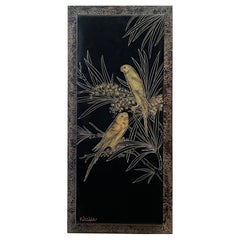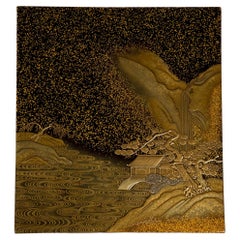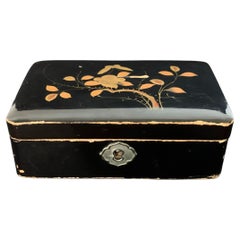Gaston Suisse Furniture
to
1
1
1
1
1
1
1
1
1
1
1
1
1
12,855
3,842
2,377
2,228
Creator: Gaston Suisse
"Couple of parakeets in the mimosas", Gaston Suisse (1896-1988), France
By Gaston Suisse
Located in Paris, FR
Gaston Suisse (1896–1988) was a French decorator and a leading figure of the Art Deco movement. He designed several stage sets for the Ballets Russes at the Paris Opera and costumes ...
Category
1930s French Art Deco Vintage Gaston Suisse Furniture
Materials
Lacquer
Related Items
Writting box or Suzuribako in black and gold lacquer of a karstic landscape
Located in PARIS, FR
Suzuribako (writing box) in black lacquer, rectangular in shape, with a gold lacquer (maki-e) decoration of a pavilion by the edge of a waterfall and a mountain river surrounded by v...
Category
Late 18th Century Japanese Edo Antique Gaston Suisse Furniture
Materials
Gold Leaf
$7,266
H 1.19 in W 6.11 in D 6.7 in
Japonese Lacquered Box with Flower, Late of the 19th Century
Located in Beuzevillette, FR
Nice little black lacquer box from Japan. It is made of black lacquered wood and decorated with flowers and foliage. The inside is covered with red velvet. It is ideal for storing je...
Category
Late 19th Century Japanese Antique Gaston Suisse Furniture
Materials
Lacquer
$174 Sale Price
20% Off
H 1.78 in W 5.12 in D 3.15 in
Kobako in the form of a Seashell in gold and wajima lacquer
Located in PARIS, FR
Wajima-lacquer kobako in grey lacquer, decorated with gold-lacquer stripes forming a bivalve shell motif. The interior is finished in nashiji lacquer on a black ground.
Wajima lacque...
Category
Early 20th Century Japanese Taisho Gaston Suisse Furniture
Materials
Gold
Antique Burmese Kammavaca Script in Lacquer
Located in West Palm Beach, FL
An exceptional 19th-century Burmese Kammavaca manuscript, composed of 14 lacquered palm-leaf-style panels, each meticulously decorated in orange and ...
Category
Late 19th Century Burmese Antique Gaston Suisse Furniture
Materials
Wood, Lacquer
Japanese inro of the edo period adorned with a landscape houses near a lake
Located in PARIS, FR
Inrō with four gold lacquer compartments, decorated with a lake landscape. Accompanied by a bronze ryusa manju.
Small boxes formed of compartments that fit one on top of the other, i...
Category
Late 18th Century Japanese Edo Antique Gaston Suisse Furniture
Materials
Gold
$6,661
H 2.6 in W 2.17 in D 0.79 in
Pair of Early 19th Century Chinese 'Lazy Chairs' in Walnut and Black Lacquer
Located in Kastrup, DK
Pair of 'Lazy Chairs' in walnut, black lacquer with a natural cracked wear that gives the chairs an exciting and artistic look.
Ming style, early 19th century China.
The term 'Lazy'...
Category
19th Century Chinese Ming Antique Gaston Suisse Furniture
Materials
Walnut, Lacquer
$3,118
H 35.83 in W 22.84 in D 26.78 in
Fine Japanese Lacquer Takamakura Geisha Pillow, First Half of the 20th Century
Located in Ottawa, Ontario
A fine Japanese lacquer Takamakura Geisha pillow, first half of the 20th century. Depicting Shi-Shi Lion between peony and rock in gold, silver, red and ...
Category
Late 19th Century Japanese Japonisme Antique Gaston Suisse Furniture
Materials
Abalone, Lacquer
$1,250
H 3.5 in W 8.75 in D 4 in
Japanese Kobako box in the form of a furoshiki present in gold and black lacquer
Located in PARIS, FR
Rectangular and flat lacquer Kobako (small box) representing a furoshiki knot seen from above. Fundame background, furoshiki in takamaki-e with floral pattern, inside the folds of th...
Category
Late 18th Century Japanese Edo Antique Gaston Suisse Furniture
Materials
Gold
$2,785
H 0.6 in W 1.97 in D 2.76 in
Pair of Antique Japanese Lacquer Trays
Located in Hudson, NY
Pair of antique Japanese Lacquer Trays, Taisho period (1912-1926) beautifully decorated with a miniature landscape of pea pods on the vine and a gold cricket set...
Category
1920s Japanese Taisho Vintage Gaston Suisse Furniture
Materials
Lacquer
17th Century Pair of Chinese Silver Lacquer Plates with Mother of Pearl
Located in Brea, CA
Pair of Chinese silver, lacquer, and mother of pearl plates from the 17th century. A matching pair of ornamental antique Chinese plates, the faces ...
Category
17th Century Chinese Qing Antique Gaston Suisse Furniture
Materials
Lacquer
Japanese inro box in black and gold lacquer with a decor of snowy landscape
Located in PARIS, FR
Inrō with four boxes in black and gold lacquer, representing a person in a pavilion in a snowy landscape with mountain on the background. Realised in maki-e on black lacquer with sma...
Category
Late 18th Century Japanese Edo Antique Gaston Suisse Furniture
Materials
Gold
$5,449
H 0.79 in W 2.17 in D 2.96 in
Pair of Early 19th Century Chinese 'Lazy Chairs' in Walnut and Black Lacquer
Located in Kastrup, DK
Pair of 'Lazy Chairs' in walnut, black lacquer with a natural cracked wear that gives the chairs an exciting and artistic look.
Ming style, early 19th century China.
The term 'Laz...
Category
19th Century Chinese Ming Antique Gaston Suisse Furniture
Materials
Walnut, Lacquer
$3,118 / set
H 35.83 in W 22.84 in D 26.78 in
Gaston Suisse furniture for sale on 1stDibs.
Gaston Suisse furniture are available for sale on 1stDibs. These distinctive items are frequently made of paper and are designed with extraordinary care. There are many options to choose from in our collection of Gaston Suisse furniture, although gold editions of this piece are particularly popular. Many of the original furniture by Gaston Suisse were created in the Art Deco style in europe during the 1930s. If you’re looking for additional options, many customers also consider furniture by Pierre-Paul Jouve, Roger Broders, and Roger de Valerio. Prices for Gaston Suisse furniture can differ depending upon size, time period and other attributes — on 1stDibs, these items begin at $91,647 and can go as high as $92,846, while a piece like these, on average, fetch $92,246.


